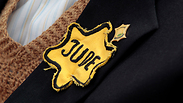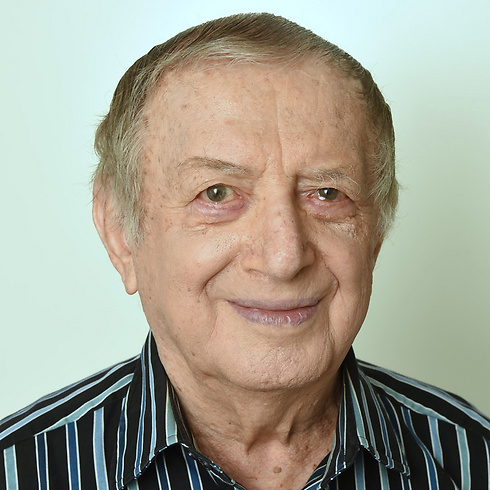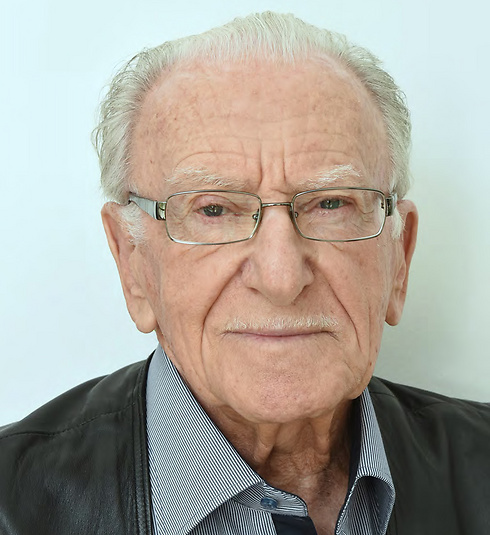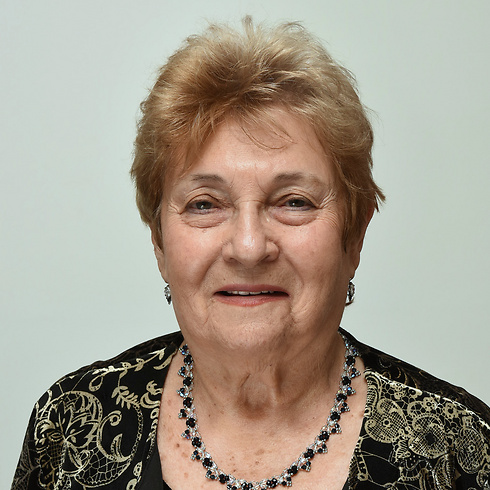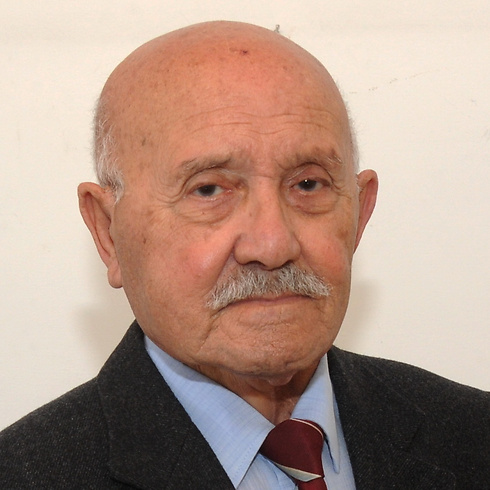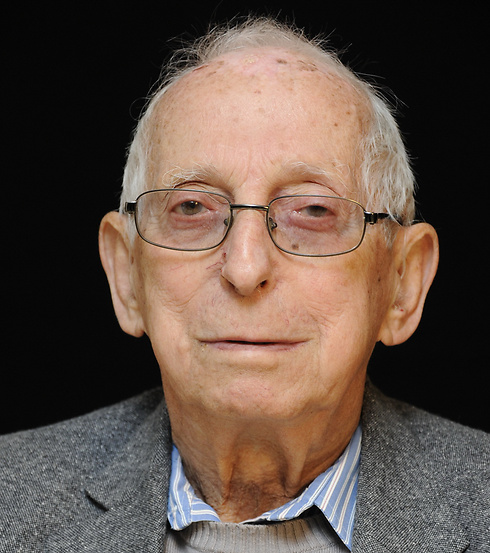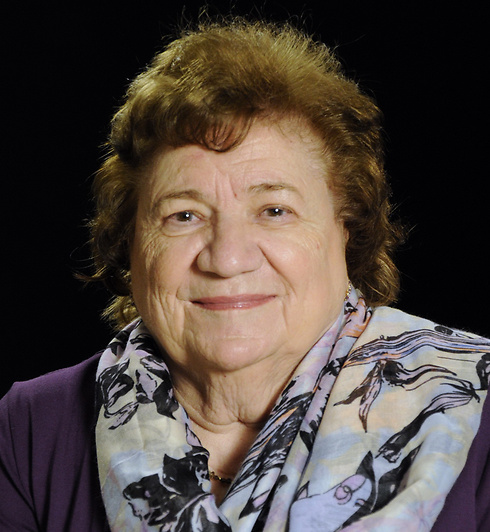Commemoration of the annual Holocaust Remembrance Day in Israel will begin on Wednesday evening with a ceremony at the Yad Vashem Holocaust Memorial.
Six Holocaust survivors, each representing one million of the six million Jews killed in the Holocaust, will light a candle to remember those who did not survive the Nazis. These are their personal stories.
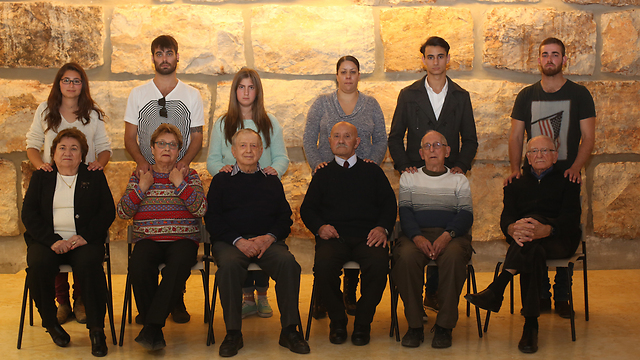
Avraham Harshalom
Avraham Harshalom (born Avraham Fridberg) was born in 1925 in the town of Pruzhany in Poland (today Belarus). His parents, Cyra and Mozes, spoke Yiddish at home, but Avraham and his brother Sioma studied at Hebrew-language schools.
In June 1941, the Germans occupied Pruzhany, establishing a ghetto a few months later. In January 1943, the deportation of the Jews of Pruzhany to Auschwitz began. "During the selection, I said that I was born in 1924 – one year older than I was," said Avraham. "I thought it best to pretend I was no longer a boy." His parents and grandmother Ester were led from the ramp at Birkenau to their deaths. Avraham and Sioma went into the camp together. A few weeks later Sioma fell sick and was murdered in the gas chambers.
In June 1944, Avraham escaped Auschwitz with two partners by replacing their prisoners’ garb with civilian clothes and hiding in a pit covered with tin and tobacco so the SS dogs couldn’t sniff them out.
"We heard the sirens and the barking dogs over us. We held our breath. Our situation was intolerable. The holes were small and the air pockets probably got blocked," said Avraham.
A few days later, Avraham and one of his fellow escapees were caught. They were severely whipped and Avraham was forced to wear the round, red patch of a criminal.
In October 1944, some 10,000 inmates were evacuated from Auschwitz. Avraham and his friend took the red patches off their inmates’ clothing and managed to blend in with them. He was sent to a number of camps and eventually was marched to Buchenwald.
In Buchenwald, he posed as a Pole, and was sent by train to the Leitmeritz and Flossenbürg camps. After a few weeks, the prisoners were evacuated by train. When the train stopped, Avraham and two of his friends ran away, eventually reaching Prague. Seeing a young man and woman at the train station, they took a risk and ran towards them. The man brought them clothes and arranged for them to take refuge at his mother's house, Jiřina Sobotková, who was later recognized as Righteous Among the Nations. Avraham hid in the storeroom of a flower shop until the Red Army arrived.
In April 1945, the shop owner recruited Avraham into the Underground. He underwent weapons training and aided the fight against the retreating Germans. After the Red Army liberated Prague in May 1945, Avraham was awarded honorary Czech citizenship and decorated as a hero.
With the passage of the UN Partition Plan on 29 November 1947, Avraham was recruited by Hagannah envoys into a flight course with the Czech Air Force. In March 1949, Avraham arrived in Israel, and served in the Israel Air Force during the War of Independence.
Dov Shimoni
Dov Shimoni, born Erwin Schwarz, was born in Budapest, Hungary in 1919. His parents, Moshe and Gizela Beinhacker, belonged to the Neolog stream of Judaism. Dov had an older sister, Margalit.
During WWII, Dov was injured at a labor camp and hospitalized at a Hungarian military hospital. While on sick leave, he worked as a clerk in the Jewish hospital in Budapest.
In the summer of 1944, a few months after Germany occupied Hungary, thousands of Jews in Budapest, including Dov’s family, were imprisoned in a number of buildings throughout the capital city. Dov managed to transfer his family to a house whose Jewish tenants had been taken away, and after which had a sign hung on it declaring it "Jew-free." His immediate family members survived the war because of the move.
In March 1944, when the SS expropriated the Jewish hospital and ordered the patients removed, Dov and his friends converted the local Jewish school to an alternative hospital.
Dov was ordered to provide the SS with a list of the hospital’s inventory. Knowing that from that moment on he would not be permitted to take anything out of the hospital, he purposely left the smaller pieces of equipment off the list, thus enabling the hospital workers to smuggle out anything portable. This equipment was ultimately moved to a new hospital established in the Budapest ghetto at the end of 1944.
The building allocated for the hospital in the ghetto’s territory was too small to include all the sick people, so Dov helped locate and set up 18 additional buildings to serve as hospitals: four in the ghetto and 14 outside it. Contacting other hospitals and members of the labor battalion in which he had worked, he managed to recruit 22 maintenance workers and orderlies. As hospital workers, they received permits to enter the ghetto and thus managed to bring food and medicine inside, as well as to take patients outside.
After the region was liberated by the Red Army, Dov set about restoring the Jewish hospital. He helped establish Zionist movements in the city and participated in the Zionist Congress in Basel, in addition to managing the American Joint Distribution Committee’s health institutions in Hungary.
In January 1949, Dov immigrated to Israel with his family. He worked at a military hospital (now the Sheba Medical Center in Be'er Sheva) and then in managerial capacities at hospitals and health care organizations. After retiring, he volunteered, among other things, at the archives of the Hagannah Museum and the Israel Cancer Association.
Dov and his late wife Elisheva, had two daughters. Dov is now married to Ilona and they have nine grandchildren and four great-grandchildren.
Sara Weinstein
Sara Weinstein (born Sara Chait) was born to Benjamin and Miriam in 1935 in the town of Stepań, Poland (today Ukraine). She had five brothers and sisters.
In September 1939, the Soviet Union occupied Stepań and Sara’s two older brothers were conscripted into the Red Army. In July 1941, the Germans occupied the town and the family fled to the countryside, but they were caught and forced into the ghetto. There, Sara sometimes joined the street cleaners and received a little food in exchange.
On the eve of the ghetto’s liquidation in August 1942, a friend named Popil smuggled the family into his house outside the ghetto. A few weeks later, Ukrainian villagers broke into Popil’s home and shot the people they found there. Popil, who was later declared a Righteous among the Nations, was murdered along with his wife and Sara’s mother, who had protected Sara with her body. Sara was wounded in the shoulder and back.
After the slaughter, the murderers set fire to the house and left. When they had gone, Sara's father shouted, "Whoever’s alive, get up and let’s get out of here!"
Sara, her father, her brother and her two sisters buried their mother in the nearby forest, where they and others found refuge. They dug pits with their hands for water and shelter, covering themselves with leaves and branches at night.
At night, the men would go to the nearby villages to steal food, clothing and oil to remove their head lice. If discovered, the families would be forced to flee deeper into the forest, further from sources of food. The children learned to play games without making a sound. For the entire time they lived in the forest, Sara wore the same dress. "For many years afterwards, I just never felt the cold," she recalls.
In the summer of 1944, after the Red Army liberated the region, Sara’s father was murdered by local Ukrainian villagers. Sara and her two sisters were transferred to Lena Küchler’s orphanage, where they were well-treated. Sara then traveled to Milan, Italy, and lived for a while in the children’s home in Selvino. She immigrated to Israel in 1947, settling in Kibbutz Givat Haim, where she studied and worked. A year later, she joined a group of peers at Kibbutz Givat Hashlosha. At the age of 16 she joined the IDF, and after being discharged she married Avraham.
Sara tells her life story at schools, to IDF units and to youth groups. She is active in Amcha, a support organization for Holocaust survivors, which she calls her "second home."
Sara and Avraham have three daughters, six grandchildren and three great-granddaughters.
Ephraim Reichenberg
Ephraim (Moshe) Reichenberg was born in 1927 in the town of Pápa, Hungary to Avraham and Mahala. He and his brother Menashe were the oldest of seven brothers and sisters. When they were children, the family moved to Budapest.
In March 1944, the Germans occupied Hungary, and in July, Ephraim’s family was deported to Auschwitz in a cattle car. During the journey, many people died from hunger, overcrowding and suffocation.
When the transport reached Auschwitz, Ephraim and Menashe were told to say that they were twins, so that they would be taken for experimentation and not to the gas chambers. They were led with other twins to a shack in the gypsies’ camp, whose occupants told them that their parents had been murdered. Menashe tried to commit suicide on the electric fence, but Ephraim pleaded with him to survive.
The boys were taken to Dr. Joseph Mengele's laboratories for medical experiments on their vocal chords. They supported each other throughout this terrible ordeal - Menashe diligently hid bread and shared it with his brother, and even gave Ephraim a red vest he managed to acquire as a birthday present.
On January 18, 1944, Ephraim and Menashe were taken on the death march from Auschwitz. When they reached Gliwice, they were put on a roofless freight train in heavy snow, and with no food. Weaker prisoners were crushed to death. Every so often, the guards shot prisoners.
When the train reached Sachsenhausen, out of the car’s 160 passengers, only 22 were still alive, including Ephraim and Menashe. Ephraim was taken to work in a munitions factory. On April 14, 1945, they were forced on a death march to northern Germany. They were liberated on May 5 by the Red Army.
Ephraim and Menashe eventually reached Prague, where Menashe was hospitalized. Ephraim returned to Budapest to search for surviving family members, but did not find a single one.
In June 1946, Ephraim learned of his brother's death in Prague. Ephraim, whose name until then had been Moshe, changed his name to Ephraim in memory of his brother Menashe, after the sons of the biblical Joseph, Ephraim and Menashe.
In 1947, Ephraim left Hungary, reaching Eretz Israel in the beginning of 1948. He was absorbed at Kibbutz Givat Haim and served in the Hagannah and Palmach. In 1967, he began to suffer from complications in his throat in the wake of Mengele's experiments, eventually losing his voice. In 1984, he regained the ability to speak with the aid of a device manufactured in Germany.
Ephraim worked for the Communications Ministry and Bezeq until his retirement. Today he tells his life story in schools, and organizes meetings of survivors of Mengele’s experiments.
Ephraim and his wife Yaffa have two sons, five grandchildren and three great-grandchildren.
Eggi Lewysohn
Ernst-Günther (Eggi) Lewysohn was born in 1924 in Breslau, Germany (now Wrocław, Poland) to Georg-Josef and Käte Kornblum. Eggi's older sister Alice went to live with relatives in Britain in 1937.
In December 1938, after the Kristallnacht pogrom, Eggi joined a Youth Aliya group. His group was supposed to travel to Britain for agricultural training, but with the outbreak of WWII, they were redirected to Denmark. Eggi’s father accompanied him to the train, where they tearfully parted ways. "It was clear to both of us that we would never see each other again," recalls Eggi.
In Denmark, the group members were dispersed to different farms. Eggi’s farmer opposed the Germans and welcomed him as a son. The hard labor on the farm invigorated Eggi. Once a week, the group met and studied Hebrew, Jewish history and Zionism. After the German occupation of Denmark in April 1940, Eggi had to report to the police from time to time, but the group continued to meet and prepare to immigrate to Israel. Two years later, Eggi moved to another farm.
In October 1943, the entire group was caught during a German manhunt and deported by cattle car to Terezin. Under terrible conditions in the ghetto, Eggi was forced into manual labor and formed a cooperative group with three friends, sharing food and clothing.
When packages arrived from the Danish Red Cross, the group traded their contents to enhance their diet. In September 1944, Eggi was ordered to participate in the Nazi propaganda film shot at Terezin, but he refused. A month later, some 18,000 of the ghetto’s Jews were deported to Auschwitz. The prisoners from Denmark, including Eggi, were forced to load the deportees onto the trains.
In April 1945, Eggi was liberated from Terezin with a group of Danish Jews in a deal brokered by Count Bernadotte. As he boarded the white bus of the Red Cross, Eggi threw away his yellow star. After a five-day journey through Germany, the group reached Denmark and from there was transferred to a refugee camp in Sweden. At the war’s end, Eggi returned to his original Danish host, who told him that his father had passed away due to illness and that his mother had been deported to the east – to an extermination camp.
Eggi visited his sister in England and then returned to Denmark for a few years. In 1951, he arrived in Israel and settled in Kibbutz Neot Mordechai. Eggi tells his testimony in schools across Israel.
Eggi married Ayala, who passed away, and together they have four children, 11 grandchildren, and 14 great-grandchildren.
Shela Altaraz
Shela Altaraz was born in 1934 in Štip, Macedonia, the youngest of four children. Her father, David Sion, passed away before the war.
In April 1941, Macedonia was occupied and annexed to Bulgaria. On March 11, 1943, Shela and her family were expelled to the city train station and robbed of their property. Together with hundreds of members of the city’s Jewish community, the family was taken to the warehouses of the Monopol cigarette factory in Skopje, where they were held in terrible conditions.
Three weeks later, Shela’s sister Bella was allowed to leave Monopol due to her Italian citizenship. Before Bella left, their mother Dudun pushed Shela into Bella’s arms, telling her: "Take the little one." Weeping and shocked, Shela and Bella watched from a nearby hill as those left behind were forcibly deported. All of the deported family members were murdered at Treblinka.
Shela and Bella went to Pristina, where Bella ended her life after her husband was imprisoned. Left alone, Shela began doing housework for a friend of her sister. In the spring of 1944, with the expulsion of the Jews of Pristina, Shela and her sister's friend found sanctuary in a Muslim village.
Shela fell ill with typhus and was taken to hospital, but fled once more after someone revealed she was a Jew. The two girls were caught and transferred to a concentration camp for political prisoners. Shela was the only child in the camp; at night she would wake up screaming from nightmares over what she witnessed there. She toiled away and the food was meager. Because she did not utter so much as a word, the camp’s inhabitants nicknamed her "the mute."
After the Red Army liberated the camp, Shela was brought to a house for female survivors. They tended to her injuries, burned her lice-filled clothes and bathed her. She was moved from home to home, eventually arriving at an orphanage in Belgrade. There, in the presence of many children in the same vulnerable state, Shela could finally cry like a child. Shela stayed at the orphanage for four years.
In 1948, emissaries from Israel came to the orphanage seeking to bring the children to Israel. Shela arrived in Israel in 1949, settling with a Youth Aliya group at Kibbutz Ein Dor, where she met her future husband, Avraham. After serving as a medic in the army, she came to Jerusalem and began working as a nurse at the Talbiya Mental Health Center. She later worked at a WIZO children’s home.
Shela and Avraham have three children, 10 grandchildren, and three great-grandchildren.
Information about the six survivors sourced from Yad Vashem website.
